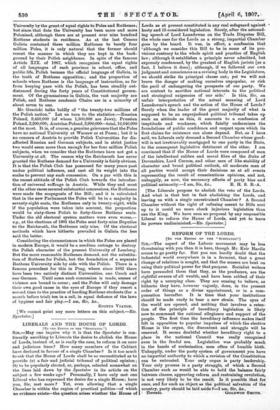REFORM OF THE LORDS.
[TO TUN EDITOR OP THE °SPECTATOR:1 Sne,—The aspect of the Labour movement may be less threatening with you than it is here, though Mr. Keir Hardie seems to go pretty far. But you can hardly doubt that the industrial world everywhere is in a ferment, that a great change of relations is sought, and that the masses are bent on using their political power for that purpose. Socialist writers have persuaded them that they, as the producers, are the rightful owners of all wealth, and have been robbed of their right by a usurping class. They are ceasing to believe, as hitherto they have, however vaguely, done, in the present order of things as a divine appointment, or in a com- pensation hereafter. It is time that your institutions Should be made ready to bear a new strain. The eyes of the world are opened, and nothing that involves a reten- tion of the principle of hereditary legislation is likely how to command the rational allegiance and support of the people. The first time the hereditary influence makes itself felt in opposition to popular impulses of which the elective House is the organ, the discontent and struggle will be renewed. It seems doubtful whether hereditary right to a place in the national Council was really recognised even in the feudal era. Legislation was probably much in the hands of ecclesiastics, men often of bumble birth. Unhappily, under the party system of government you have no impartial authority to which a revision of the Constitution can be entrusted. Your only organ is party leadership. Your only process is a party struggle, of which a Second Chamber such as would be able to hold the balance fairly between classes, approving reform and restraining revolution, is not very likely to be the result. Is it possible that for once, and for such an object as the political salvation of the country, party should be laid aside 1"—I am, Sir, &c.,










































 Previous page
Previous page